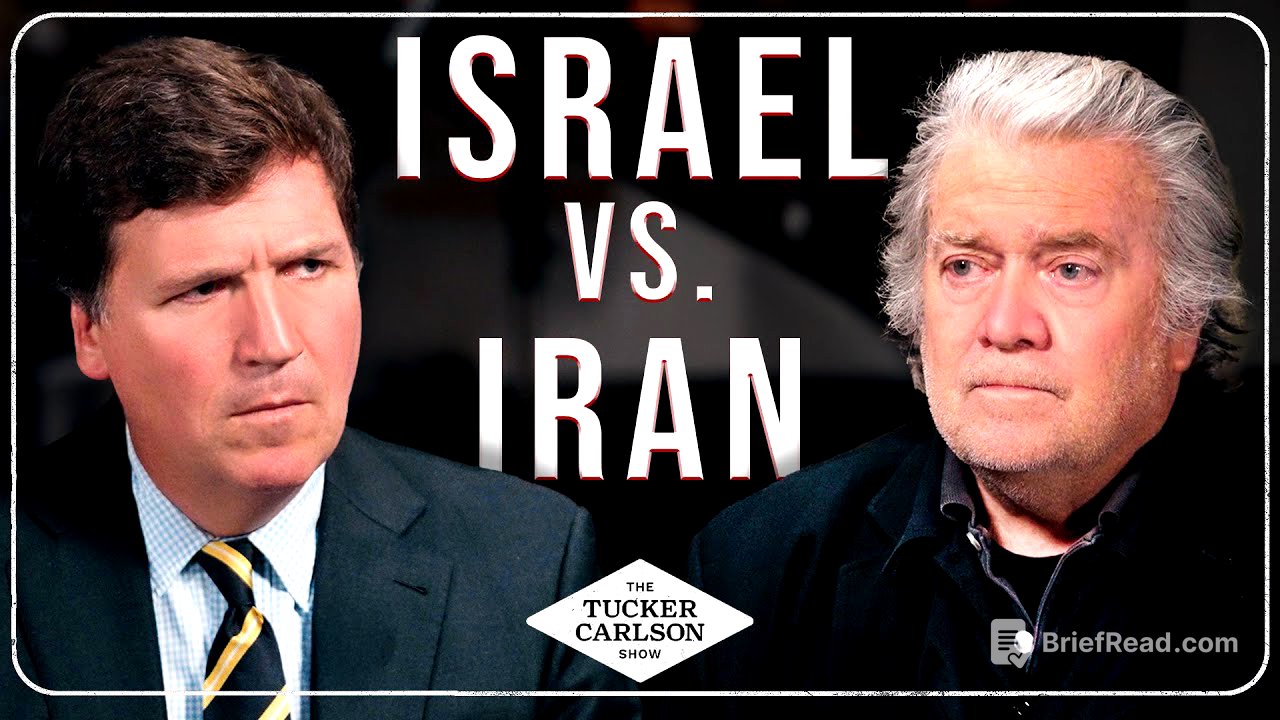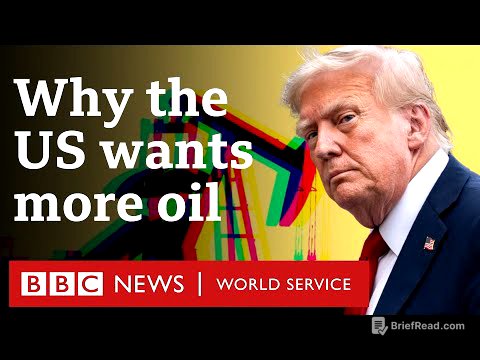TLDR;
This episode of Tucker Carlson features Steve Bannon discussing the potential downfall of the MAGA movement due to a possible war with Iran, the influence of the deep state, and the necessity of confronting establishment forces to preserve American sovereignty. They emphasize the importance of addressing internal issues like immigration and economic nationalism, while also criticizing the Republican Party's controlled opposition and the spiritual war occurring within the country.
- The potential war with Iran could fracture the MAGA coalition.
- The deep state is a powerful apparatus that undermines the President's agenda.
- Confronting establishment forces is crucial for preserving American sovereignty.
Will the Iran War Be the Downfall of MAGA? [0:00]
Steve Bannon suggests that a potential war with Iran could destroy the coalition that elected Donald Trump, which was built on ending forever wars, securing the border, and renegotiating trade deals. He expresses concern that the focus on the Middle East distracts from critical domestic issues like deporting illegal immigrants, which he views as essential for maintaining national sovereignty. Bannon argues that an entrenched apparatus in Washington, D.C., driven by Wall Street, foreign investors, and Silicon Valley, is pushing for these wars against the interests of the American people.
Fox News’ Pro-War Propaganda [6:55]
Bannon criticizes Fox News for what he perceives as a central role in pro-war propaganda, drawing parallels to the Iraq War, which he argues was built on lies and misinformation. He contends that the rise of Trump was a direct result of the failures of the Iraq War and the 2008 financial collapse, events that exposed the disconnect between the establishment and the American people. Bannon calls for a total vetting of intelligence related to both Iran and Ukraine, suggesting that American intelligence may have been manipulated or misrepresented.
The Never-Trumpers Pretending to Be On Trump’s Team [12:42]
Bannon highlights the hypocrisy of "Never-Trumpers" who now claim to support Trump while simultaneously undermining his agenda, particularly his efforts to negotiate peace in Ukraine and the Middle East. He asserts that these individuals are allied with the deep state and are exacerbating conflicts rather than working towards resolution. Bannon warns that the world is already in a "shooting part of the third world war" and that the next 200 days are critical for the American Republic.
Attacks on Anti-War Voices [15:30]
Bannon expresses concern over the persecution of anti-war voices, drawing a comparison to historical instances where opponents of war were jailed or demonized. He notes the attacks on Tucker Carlson for questioning the rush to war and suggests that these attacks are meant to silence dissent and prevent a national discussion on the issue. Bannon calls for a War Powers Act debate to allow the American people to weigh in on the decision to engage in military conflicts.
The CIA Is Too Powerful [25:48]
Bannon argues that the CIA operates with too much power and lacks civilian control, functioning as a venture capital firm with an unknown budget and far-reaching influence. He claims that the agency controls the inter-agency process, embedding itself deeply within various government departments and thwarting efforts to challenge its authority. Bannon suggests that the CIA is actively working to undermine President Trump's second term and ensure the election of a hand-picked successor.
Why Is Tom Cotton Working to Keep the JFK Files Classified? [35:00]
Bannon questions why Senator Tom Cotton, chairman of the Senate Intelligence Committee, is working to keep the Kennedy assassination files classified, suggesting that their release could expose a coup d'état that occurred in 1963. He criticizes Cotton for acting on behalf of the CIA rather than the people of Arkansas. Bannon also points to the involvement of Jerry Ford, a member of the Warren Commission, in suppressing key testimony related to the assassination.
Lindsey Graham’s Warmongering Motives [41:16]
Bannon questions Lindsey Graham's motives for warmongering, particularly his activities in Ukraine, where he seemed to have inside information about impending events. He suggests that Graham and Mike Pompeo may be violating the Logan Act by undermining President Trump's efforts to de-escalate conflicts. Bannon calls for their arrest or the cancellation of their passports, arguing that they are acting against the interests of the commander-in-chief.
Why Was Nobody Held Accountable for the Iraq War? [48:30]
Bannon laments the fact that the architects of the Iraq War were never held accountable for their actions, allowing them to continue to advance in American society. He argues that the same playbook used to justify the Iraq War is being used again to push for conflict with Iran. Bannon criticizes the Republican Party for its controlled opposition and its failure to challenge the establishment's agenda on issues like immigration, trade, and forever wars.
The Spiritual War Is More Evident Than Ever [54:12]
Bannon describes the current state of affairs as a spiritual war, with a dark spectre hanging over Washington, D.C. He argues that the American empire has destroyed the inner workings of the United States and that the focus should be on rebuilding the republic. Bannon suggests that President Trump's strategy of hemispheric defense is a departure from the post-war American empire and that the defense budget should be aligned with this new strategy.
The California Riots [1:00:53]
Bannon discusses the conflict between federal authority and states' rights, particularly in California, where he sees the sanctuary city policies as a form of neo-Confederacy. He argues that the federal government must assert its authority and enforce immigration laws, even if it requires sending in troops or federalizing the National Guard. Bannon suggests that the battle for America will be won or lost on the streets of Los Angeles.
Why Leftists and Neocons Are Scared of the Term “Nationalist” [1:08:55]
Bannon explores why the term "nationalist" is so offensive to certain segments of the population, particularly leftists and neocons. He argues that populist nationalism, which puts America and American citizens first, is different from the connotations associated with European nationalism in the 19th and 20th centuries. Bannon suggests that the government apparatus is controlled by individuals who are attracted to money and power, and that a war is needed to challenge this establishment.









